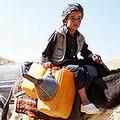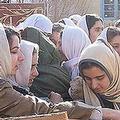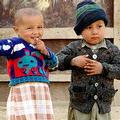 阿富汗由於境內氣候乾燥,乾旱頻仍,最近十年情況尤其嚴重。有時雨水連年不至,仰賴土地為生的人民不論性命與生計都會受到艱困考驗。
阿富汗由於境內氣候乾燥,乾旱頻仍,最近十年情況尤其嚴重。有時雨水連年不至,仰賴土地為生的人民不論性命與生計都會受到艱困考驗。
對阿富汗北部,特別是巴爾赫(Balkh)、朱茲詹(Jowzjan)、法理亞布(Faryab)、薩爾伊普(Sar-e-Pul)與塔卡爾(Takhar)等省份的農民而言,2009年格外難熬。數千災民聚集在巴爾赫省的德達地(Dehdadi)行政區,盼望得到援助。然而這些流離失所的家庭說,救援腳步緩慢,遲遲未到。
巴茲-慕罕默德(Khalifa Baaz Mohammad)是德達地亞卡圖特(Yaka Toot)地區的流離家庭代表,他說,「夏天的時候,這裡的難民營還有些工作機會。難民與小孩會去採集棉花、菠菜跟洋蔥。但是現在幾乎都沒了。」
除了食物,難民家庭在嚴寒冬季也需要燃料取暖。但此時政府官員仍在互踢皮球,交相指責對方辦事不力。
德達地行政區區長沙赫(Wali Shah)承認難民眼前情況艱困,並表示他已經和省政府難民遣返部與災害應變部的部長們討論過這些問題。
北阿富汗災害應變部部長札黑德(Rahmatullah Zahed)表示,該部門已經嘗試動員政府機關,並已送出部份援助。
札黑德說,「我們已經和高層政府官員討論過這些問題。災害應變部已經提供5592公噸的糧食給流離難民過冬,其中大部份送往偏遠地區,其餘則正在運輸途中。」
札黑德表示,處理問題的關鍵在巴爾赫省難民部。但在阿爾勃茲(Alburz)的瓊克涅克(Choqnak)地區,難民代表伊斯拉慕丁(Islamuddin)卻說,難民部也是問題之一。他斷言,有許多應該送到急難家庭的物資被難民部中飽私囊。
他說,「舉例來講,阿爾勃茲山區的315位難民原本會收到中國提供的物資。這些物資雖然有被送到當地,卻沒有交到難民手上。」
 巴爾赫商會主席羅山札達(Sayed Mohammad Tahir Roshanzada)坦承,援助難民的食物在中途轉了彎,「捐贈的糧食被低價賣入市場,完全沒人出面阻止。」
巴爾赫商會主席羅山札達(Sayed Mohammad Tahir Roshanzada)坦承,援助難民的食物在中途轉了彎,「捐贈的糧食被低價賣入市場,完全沒人出面阻止。」
巴爾赫省難民部的責任部長巴布里(Shir Mohammad Babri)提出澄清,「這些流離家庭的看法是因為不清楚問題,還有不了解本部門的運作狀況。我們是把收到的物資送給極度貧窮、最需要幫助的人。」
他同意所有難民的問題都必須得到解決,但也表示該部門沒有辦法及時給予流離難民救助。
然而在救援抵達這些飽受摧殘的地區以前,乾旱災民的處境依舊艱困。
巴茲-慕罕默德說,「我昨晚到幾戶人家去收集麵包,送給需要的人。如果物資還不快送到,這會演變成人權危機。」
Afghanistan is a dry country in which drought is frequent, especially for the past 10 years. Sometimes the rains fail to arrive for years at a time, causing severe hardship for those whose lives and livelihoods depend on the land.
This year has been harder than most for farmers in northern Afghanistan, particularly in the provinces of Balkh, Jowzjan, Faryab, Sar-e-Pul, and Takhar. Thousands have collected in Dehdadi district of Balkh province, where they hoped to find assistance. But, according to the displaced families, help has been slow in coming
"There was employment opportunity for these refugees during the summer," said Khalifa Baaz Mohammad, a representative of the displaced families in the Yaka Toot area of Dehdadi. "They and their children were collecting cotton, spinach and onions. But now they have almost nothing."
In addition to food, the families also need fuel to keep themselves warm in the freezing winter weather.
Officials, meanwhile, appear to be passing the buck, each accusing the other of failing to act.
Wali Shah, the district governor of Dehdadi, confirmed the difficulties facing the displaced people, and said that he had shared these problems with the heads of the provincial refugees and repatriation department and the department for disaster preparedness.
Rahmatullah Zahed, head of the disaster preparedness department in the north, said that his office had also tried to get the government to act.
Some assistance, he said, had been provided.
"We have shared the problem with senior government officials," said Zahed. "The disaster preparedness department has provided 5,592 tonnes of foodstuffs to the displaced people during the current winter. Most of the foodstuff has been sent to remote districts and the remainder is now being transported."
According to Zahed, it is up to the Balkh province department of refugees to deal with the problem.
But according a refugees representative in the Choqnak area of Alburz, Islamuddin, who goes by one name, the department of refugees is part of the problem. He claims the department siphons off much of the assistance that is supposed to go to the needy families.
"For example, 315 refugees in the Alburz mountain area were supposed to get assistance provided by China. The assistance was delivered to the area but not given to the refugees."
Sayed Mohammad Tahir Roshanzada, head of the Balkh chamber of commerce, confirmed that food given to assist refugees was diverted.
"The donated foodstuff is sold in the market for a very low price," he said. "Nobody does anything to stop this."
Shir Mohammad Babri, deputy head of the Balkh department of refugees, downplayed the allegations.
"This is the opinion of the displaced families who are not aware of the problems and facilities of this department," he said. "We distribute the assistance we receive to really poor and needy people."
He acknowledged that the problems of all of these people needed be solved, but said that his department does not have the capacity to provide help to the displaced people on time.
But until assistance is distributed in the stricken districts, those displaced by the drought will be in severe distress.
"I have collected bread from several houses last night to give to those in need," said Baaz Mohammad. "If assistance is not delivered soon, there will be a humanitarian disaster."
※This article originally appeared in the Afghan Recovery Report, produced by the Institute for War and Peace Reporting
附註 : 本文原刊於戰爭與和平報導研究所(Institute for War and Peace Reporting)的阿富汗復原特別報告(Afghan Recovery Report)
全文及圖片詳見:http://www.ens-newswire.com/ens/feb2009/2009-02-02-01.asp




